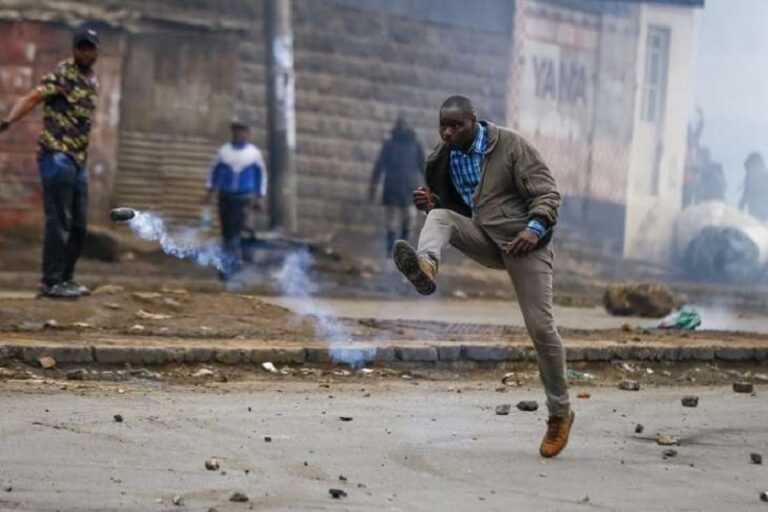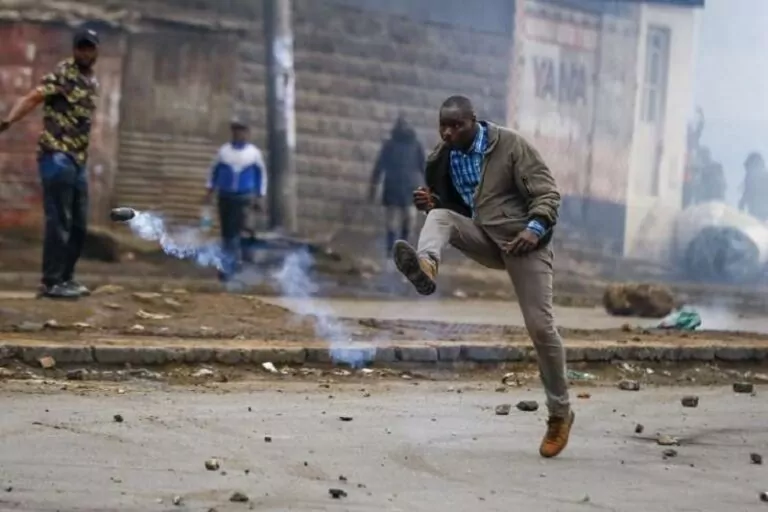

protests in kenya escalate amid rising costs of living and tax hikes
Protests erupted once again in Nairobi and other major towns in Kenya, causing widespread disruptions and bringing businesses to a standstill. This marks the second wave of protests within a week, further exacerbating the tense situation in the country.
In the midst of the unrest, the police tragically killed six people while also injuring and hospitalising a number of others. The police official stated that those who lost their lives were shot for disrupting commerce, although no further details were provided.
The opposition leader Raila Odinga has called for weekly nationwide protests and acts of civil disobedience against the President William Ruto-led administration. Odinga’s demands are in response to the recent surge in the cost of living and increased taxes imposed by the government.
President Ruto took office in September of the previous year, inheriting an ailing economy that was suffering from debt, inflation, and a declining national currency. The government argues that implementing higher taxes, including a levy for affordable housing and an increased fuel tax, is necessary to address mounting debt repayments and stimulate employment opportunities.
However, opposition parties contend that these tax hikes will further burden the already struggling Kenyan population, which is grappling with skyrocketing prices of essential commodities like food.
Protesters expressed their frustration with the current state of affairs, emphasising their independent decision to take to the streets. Ibrahim Stanley, a protester from the informal Kibera community in Nairobi, expressed their exhaustion and determination to voice their concerns through protest.
The protests led to confrontations along the highway connecting Nairobi to the main airport, with demonstrators setting bonfires and disrupting toll collection at multiple stations. In one incident, tear gas was sprayed inside a school in Kangemi, on the outskirts of Nairobi, resulting in the hospitalisation of three students.
During Friday’s protests against the tax levies, at least six individuals lost their lives. Although Kenya’s High Court temporarily suspended the implementation of the Act pending a judicial challenge, the government proceeded to raise gasoline prices.
Raila Odinga, who called for the demonstrations, is scheduled to address his supporters in Nairobi on Wednesday. Despite finishing second in the last five presidential elections, including the one against Ruto last year, Odinga remains a prominent figure, leading demonstrations against the rising cost of living and alleged electoral irregularities.
Given the history of politically motivated violence in Kenya, community leaders have issued warnings about the potential recurrence of such conflicts amid ongoing protests.
Earlier in April, the opposition and government agreed to engage in dialogue to resolve their differences and move the country forward. However, the recent protests indicate that the situation remains unresolved and tensions persist.
President Ruto’s administration justifies the tax increases, including doubling the gasoline tax and introducing a levy for affordable housing, as necessary measures to generate an additional 200 billion Kenyan shillings per year (about $1.42 billion). These funds are crucial for managing debt repayments and supporting job creation programs in Kenya.
Ruto inherited $34 billion of external debt from his predecessor, Uhuru Kenyatta, which has significantly strained the government’s cash flow. The escalating interest payments on domestic debt further exacerbate the financial challenges faced by the government, making it difficult for Kenyans already grappling with high prices of basic necessities like maize flour.
The opposition argues that these tax hikes will exacerbate the hardships faced by Kenyans, amplifying their current struggles.
The situation in Kenya remains tense as protests continue, raising concerns about the socio-political climate and the potential for further violence. The government’s ability to address the grievances of the people and find a sustainable solution to the economic challenges will be crucial for restoring stability and ensuring the well-being of the Kenyan population.
Africa is taking big steps by entering the global green technology manufacturing market to stop being just a supplier of…
Two mobile telecom leaders, MTN Group and Airtel Africa, joined forces to create a new digital infrastructure system throughout African…
South African President Cyril Ramaphosa defended his nation against claims of white discrimination made by tech magnate Elon Musk. After…
Hilton launched Signia by Hilton for its first appearance in Egypt and Africa through its hotel expansions. These hotels at…
UNICEF reported that, nearly 2900 people died of cholera across Eastern and Southern African countries while children suffer most greatly…
Enza, based in the United Arab Emirates, obtained $6.75 million in initial investment funding from Algebra Ventures and Quona Capital.…
This website uses cookies.